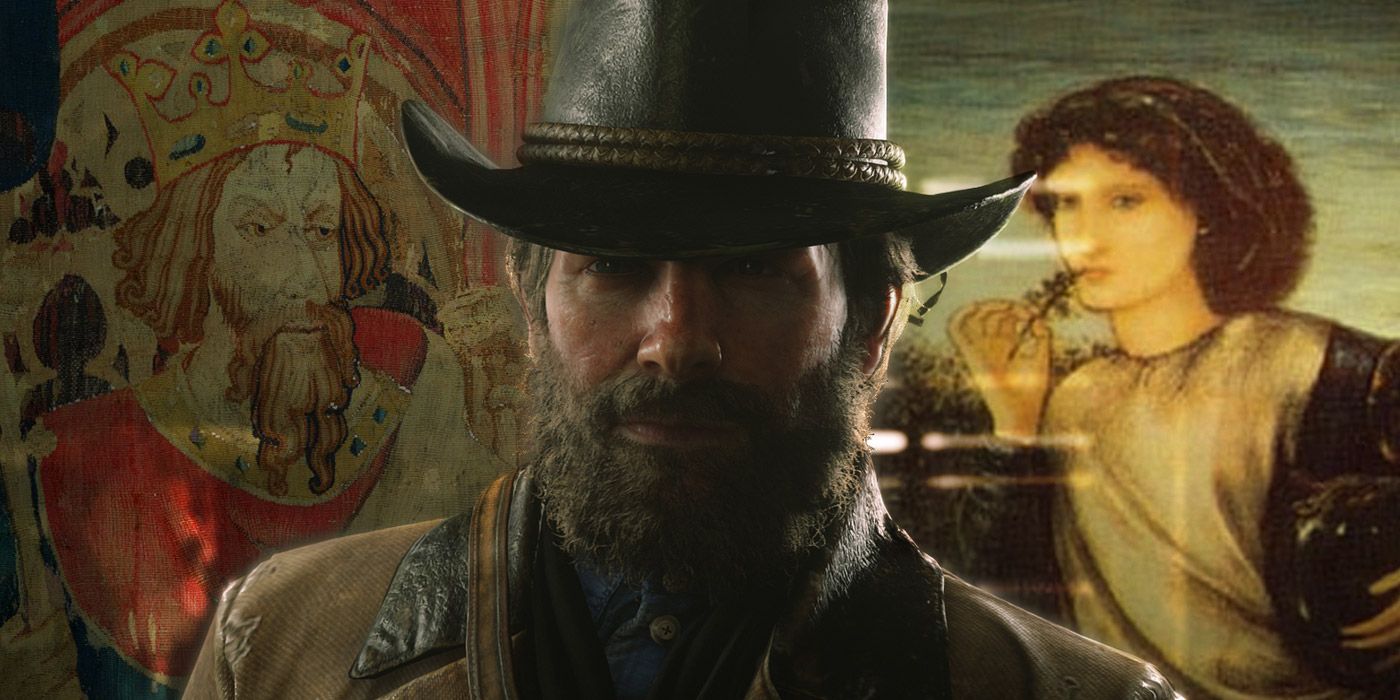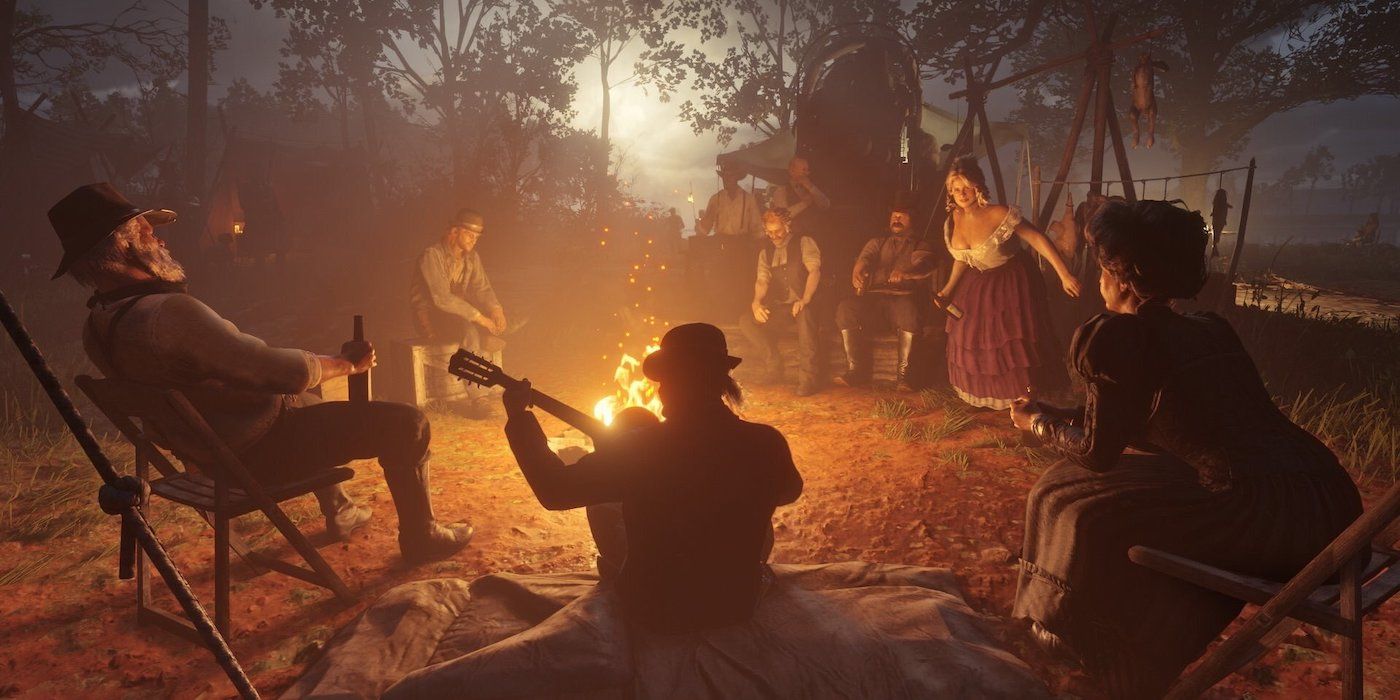How Red Dead Redemption 2's Arthur Morgan Makes the Most Out of Arthurian Legend

Red Dead Redemption 2 is filled with references to King Arthur and the Knights of the Round Table. Rockstar’s hit game may have been released back in 2018, but its locations and dialog are so packed full of details that many fans are still trying to put them all together, including these references.
The Arthurian connection in Red Dead Redemption 2 goes far beyond the protagonist’s first name, and serves a purpose far beyond showing off the storytellers’ knowledge of British mythology. Indeed, tales about King Arthur and knights errant are used in Red Dead 2 to reveal how the characters think of themselves and even fictionalize and mythologize each other and their actions. King Arthur isn’t just a reference, but reveals a deeper look into some of the characters fans have already familiarized themselves with over the last few years.

There are plenty of direct references to Arthurian mythology in the game. Jack Marston, for example, reads about Arthurian legends and mentions them in the story. One of the most interesting references to Arthurian mythology in Red Dead Redemption 2, though, is the protagonist’s name, Arthur Morgan.
It’s mash up of the name of the key hero of the myths and the name of his occasional nemesis, the enchantress Morgan Le Fay. In the game, the player steers Arthur Morgan through a moral crisis that overtakes the final years of his life through Red Dead 2's Honor system. The choice of name isn’t as simple as King Arthur representing good and Morgan Le Fay representing bad since both characters do good and terrible things.
In the myths, King Arthur’s end is an almost karmic reaction to evil he has committed in his life. In Sir Thomas Mallory’s Le Morte D’Arthur (The Death of Arthur) one of the most important works on the mythical king that attempts to composite his entire life story, King Arthur has a ship filled with children and drowned when he hears that a child he had with his half-sister will return to kill him. The child, Mordred, survives, and eventually is the death of Arthur.
Similarly, the disease that kills Arthur Morgan in Red Dead Redemption 2 is the indirect result of one of his least honorable actions, beating the ill Thomas Downes to retrieve a loan on behalf of Leopold Strauss and consequently contracting tuberculosis. A terminal disease may not sound much like King Arthur’s story, but making Arthur's death the result of a slow illness also fulfills the role of the prophecy itself. Arthur Morgan, like King Arthur, spends much of the story aware of his impending doom, and feeling that it is a form of moral retribution for the evil he has committed in his life.

The Knights of the Round Table in this comparison are, of course, the Van Der Linde Gang. It is less based on the Knights of the Round Table that it bases itself on them in-universe. Particularly towards the beginning of the game, the gang considers themselves noble despite constantly committing violence themselves and willing to help those in need, especially women like Sadie Adler. As a result, the members of the Van Der Linde Gang themselves make constant appeals to fiction to justify their actions.
Dutch Van Der Linde, in particular, constantly appeals to an ideal of the Old West and the frontier as moral justification for his increasingly erratic actions. After learning Uncle, Mary Beth, and Pearson have abandoned the gang in the night, Dutch says that there “ain’t no freedom for no one in this country no more,” an appeal to a totally romanticized version of the western frontier.
Ascribing each knight to a member of the gang doesn’t quite line up – for a start, it’s Dutch, not Arthur, who is the leader. However, Rockstar leans into the Western genre’s long heritage. Western movies like A Fistful of Dollars are well known for remaking Samurai movies, in this example’s case, the Kurosawa movie Yojimbo. There is a broader inheritance that captures part of the appeal of both Samurai movies and Westerns, however: stories of knights errant, including Arthurian mythology.

Part of what’s so clever about Red Dead 2’s Arthurian references is that, while the characters also make them in-universe, they are also a reminder of that universe’s grounding in fictions that have been used as foundational myths. In King Arthur’s case, it’s the foundation of a unified Britain after the Saxon invaders are repelled, and in the case of the Van Der Linde Gang, it’s America and the idea that the advance of the American frontier came with its own kind of honorable freedom that Dutch holds onto.
Red Dead Redemption 2 is invested in mythology in part because it wants the players to be made constantly aware of the role mythologization plays in the minds of the characters as they justify their actions, and because on a meta-level the entire creation of the Red Dead universe is the recreation of a mythical America. By reminding players that the characters are constantly fooling themselves with myths, the player is encouraged to also become increasingly critical of the mythical world they are exploring in the game itself and have been fed through genres like Westerns in the past.
There are many more references to Arthurian mythology which players can find throughout Red Dead Redemption 2. There's direct references in the epilogue mission “The Wheel” – named after the idea of the wheel of fortune used by Mallory throughout Le Morte D’Arthur to symbolize the good and bad a man does on the road to his fate. There's even the nickname Jack Marston is given by his father: Lancelot. What is most impressive, however, is not the amount of references in the game, but the way that Arthurian legend is used to remind players, even those unfamiliar with the specifics of the myths, about Red Dead's deep investment in the stories people hang onto, and why.
Red Dead Redemption 2 is available now for PC, PS4, Stadia, and Xbox One.

Post a Comment